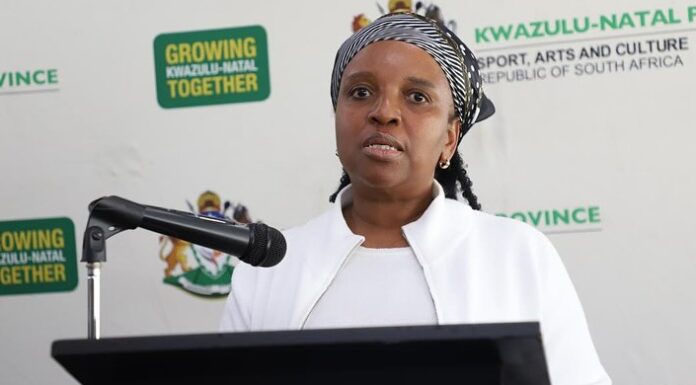KwaZulu-Natal’s department of arts and culture has set aside R1.6-million exclusively for CCIFSA-KZN (Cultural & Creative Industries Federation of South Africa).
Ntando Mnyandu, the department’s spokesperson, confirmed the cash injection.
The organisation is set to receive this money, despite Minister of Arts and Culture Gayton McKenzie’s announcement in 2024 that CCIFSA would not receive a cent from his department.
“CCIFSA has been getting money from the department for years, but they never reported back,” McKenzie told the National Assembly in November.
“They never told us what they were doing with that money. It will not receive a cent from the department.”
Listed in department’s budget
Said Mnyandu: “CCIFSA is listed in the department’s official budget documentation, and R1 650 000 has been allocated to support its operations during the current financial year.
“This funding supports CCIFSA’s core administrative functions, capacity-building initiatives, and operational improvements, enabling it to fulfil its coordination mandate effectively.
“The intention is to strengthen the sector’s institutional capacity so it is on par with other recognised federations, such as the sports confederation, providing a stable base to represent and serve the cultural and creative industries.”
CCIFSA will be receiving the payment despite longstanding complaints from KZN artists that KZN-CCIFSA is failing them.
Last week, artists claimed that the head of the department, Dr Thobile Sifunda, was responsible for their plight, alleging that she was not providing them with opportunities and was instead referring them to CCIFSA to secure gigs within the department.
Sunday World has seen the evidence supporting this complaint. The department has justified Sifunda’s actions.
“The department works with CCIFSA because it was established through a national directive from the former president.
“The intention was not to give CCIFSA influence over departmental decisions but to ensure the sector had a legitimate, unified voice across all three spheres of government: national, provincial, and local,” said Mnyandu.
CCIFSA likened to Sascoc
Mnyandu said that CCIFSA is operating like the South African Sports Confederation and Olympic Committee (Sascoc).
“CCIFSA coordinates sectoral and provincial structures for the various CCI [cultural and creative industries] sectors, facilitating representation, communication, and participation in programmes.
“Its role is comparable to the South African Sports Confederation and Olympic Committee, which represents sport federations without directing government decisions but ensures the sector is organised, consulted, and fairly represented.
“The department does not use CCIFSA to appoint artists. Instead, DSAC [department] supports the coordination and strengthening of sector representation through CCIFSA as the recognised national body.”
Mnyandu continued: “DSAC engages directly with all sectors in line with its constitutional and policy mandate. CCIFSA’s role is to represent the cultural and creative industries during formal consultations that occur while the department develops its strategies and programmes.
“Artists are appointed based on departmental programme requirements, with opportunities made available through public advertisements, targeted calls for priority programmes, unsolicited proposals, and responses to community-driven requests.”
Forensic investigation
The plight of artists under CCIFSA leadership, both at the provincial and national levels, is well documented.
Consequently, last year, the portfolio committee on sport, arts, and culture, in collaboration with McKenzie, initiated a forensic investigation.
Eugene Mthethwa, the EFF and portfolio committee member, slammed DSAC-KZN and said: “The National CCIFSA is under forensic investigation, with DSAC having stalled the funding.
“What logical reasoning is there for the provincial government to continue supporting an extension of a body that is under investigation?
“If they do so, they do so at their peril, and hopefully, they are getting reports on the usage of the funding they are availing.
“Maybe a provincial setup is working for them, but there needs to be scrutiny of those allocations.”



